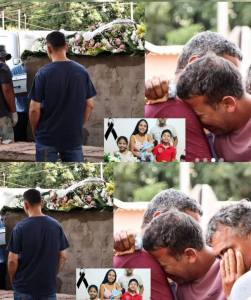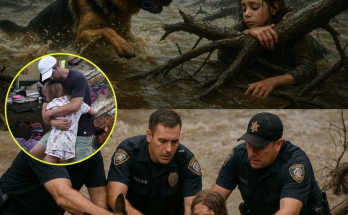A Father’s Grief: Seeking Support Amid the Wake and Burial of His Wife and Children
The sun was unusually bright for such a devastating day, casting long shadows across rows of mourners dressed in black. Among them stood one man, his face etched with pain far beyond what most people ever experience. His name was Michael Reyes, a husband and father — now a widower and the sole survivor of a tragedy that stole the very center of his world.
Just a week prior, a head-on collision on Highway 74 had claimed the lives of his wife, Elena, and their two children, 7-year-old Mia and 5-year-old Lucas. What began as an ordinary drive home from a weekend at Grandma’s ended in catastrophe when an oncoming truck crossed the median. Michael, who had taken a separate car after staying behind to help a friend with work, received the call that no one ever wants to get — and his life has not been the same since.
The Weight of Loss
As the wake began, Michael sat silently in the front row of the funeral home chapel. Three caskets — far too small for such a setting — stood before him. Friends and extended family filed in with tears and tight embraces, many unsure what to say. What can you say to a man who has lost everything?
Michael hadn’t spoken much in the days following the accident. He answered questions with nods and simple phrases, sometimes not at all. Every movement seemed deliberate, mechanical, as if his soul was still trying to catch up with the devastating truth. It wasn’t just the pain of loss that paralyzed him — it was the magnitude of the emptiness left behind.
He needed support. And though many were willing to offer it, few knew how.
When Words Aren’t Enough
At the wake, his brother James placed a hand on his shoulder, hoping to give comfort through quiet presence. Friends from church stood nearby, whispering prayers. Michael’s coworkers collected funds to help with expenses, while neighbors dropped off food and offered to walk the family dog. Yet nothing felt enough. Grief this deep defies casseroles and condolences.
At one point, Michael attempted to stand to speak — to say something about his family. He cleared his throat, walked to the podium, but then froze, staring at the caskets. After a long pause, he simply said:
“They were my whole life.”
Then he walked back to his seat.
It was all he could manage.
The Day of the Burial
When the morning of the burial arrived, the weather had shifted. Grey clouds hung low, and a soft rain began to fall as the hearses pulled into the cemetery. Michael walked slowly behind them, flanked by his siblings. His steps were heavy, as if the ground itself might swallow him.
At the gravesite, umbrellas popped open while the minister recited the familiar scriptures about eternal life and divine comfort. Michael barely heard the words. His mind replayed Mia’s giggles at bedtime, the way Lucas clung to his leg every morning, and Elena’s gentle smile as she sang in the kitchen. Now, all gone — lowered into the ground before his eyes.
As the caskets were gently placed into the earth, Michael collapsed to his knees. His body shook with sobs that finally broke through the emotional dam. It was raw, haunting, and deeply human. James knelt beside him, arms wrapped tightly around his brother as others looked on with tears of their own. The pain was too big to carry alone.
And in that moment, Michael didn’t have to.
A Village Rises
In the weeks that followed, something extraordinary happened. People rallied. They came not with platitudes, but with presence. A neighbor organized a rotating schedule so that someone was always there to check in on Michael — not to “cheer him up,” but simply to sit in silence or help with small tasks like cleaning or paperwork.
His church formed a grief support group specifically for those who had experienced family loss. His children’s school created a memorial garden with hand-painted stones, each bearing a student’s message to Mia and Lucas. A local counselor offered free weekly sessions to help Michael process the trauma, and a trauma dog — a gentle golden retriever named Scout — was assigned to accompany him during the most difficult days.
It didn’t erase the pain. Nothing could. But slowly, Michael began to breathe again. To speak again. To cry without shame. To share memories of his family without being overwhelmed by despair.
The Long Road of Healing
Grief, especially the kind that follows the sudden death of loved ones, is not linear. There are days when Michael still can’t leave the house, when the silence in the hallways feels deafening. Nights when he wakes up reaching for Elena, only to remember she’s no longer there. Moments when he hears a child’s laughter and instinctively turns, expecting to see Mia or Lucas.
But in the shadow of his sorrow, he also began to find purpose. He started journaling, writing letters to each of his lost loved ones. He began speaking — tentatively at first — at grief support meetings, helping others who had lost spouses or children. He created a foundation in their name, offering scholarships to young students who loved art and reading, just like his kids.
He says he doesn’t believe in “moving on,” but he is learning to move with the grief. To carry it as part of him — not as a burden, but as a testament to how deeply he loved and was loved.
A Message for the Brokenhearted
Michael often says that in those early days — the wake, the burial, the weeks that followed — he didn’t survive by strength. He survived by the strength of others.
“Grief isolates you. You feel like you’re on an island no one can reach. But when people show up, not to fix you, not to rush you, but just to be with you — that’s when healing can begin.”
Today, he walks with scars that will never fully fade. But he walks. And for a man who once thought he couldn’t take another step, that is everything.

